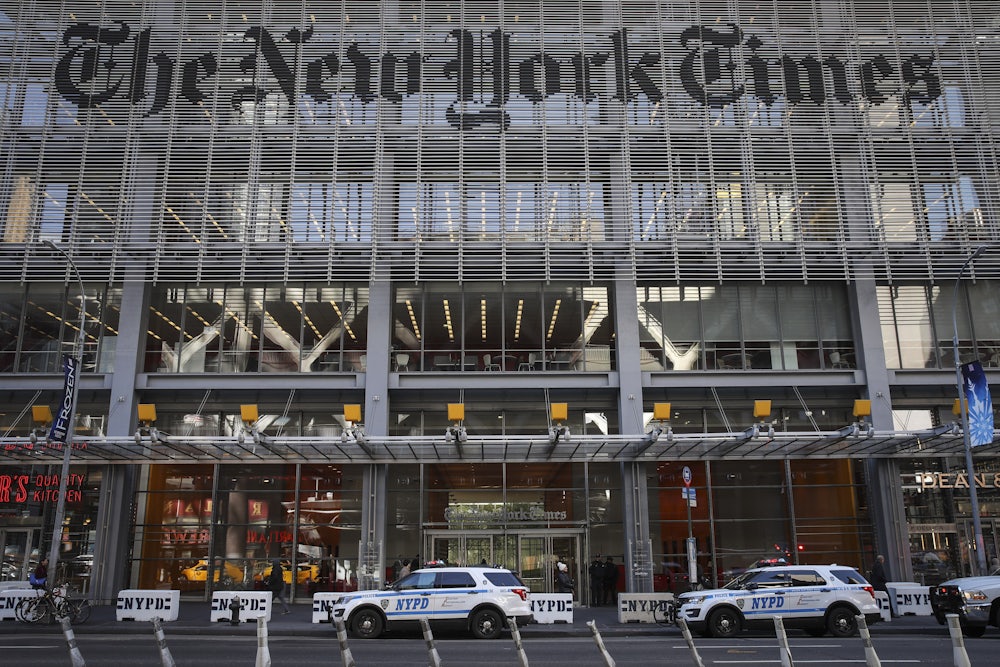In Bret Stephens’s latest column for The New York Times, he asks the reader to believe two extraordinary things: that he has discovered a secret pool of voters who might hand a surprise win to Donald Trump in November and that he has done something resembling reporting.
Over the last four years, the Times and other media outlets have been harangued for going on yokel safaris. Reporters wander into a diner in West Virginia, collect quotes, and report back with patronizing chagrin that the people gnawing on corned beef hash still like the president. Stephens’s conservative colleague on the op-ed page, David Brooks, once said America was ruined because his friend didn’t know what soppressata was. Stephens has now elevated the game, spotlighting one anonymous New Yorker as the face of a “discreet base of support” for the president, one that has escaped the notice of pollsters and reporters alike. The result is a column that combines the worst of election punditry and the worst of opinion journalism.
“Chris” is a fiftysomething registered Democrat. She is a “well-educated, well-traveled, and well-informed” lesbian who works as the manager at a “store” in Manhattan, where she lives. She likes Bernie Sanders and has voted for politicians from both parties. It’s unclear how she and Stephens found one another. What is clear is that Stephens is delighted by her, showing her off the way a nineteenth-century explorer would present an exotic species to an enthralled crowd.
She is presented as an independent, high-information voter who isn’t buying what the Democrats are selling. Chris is the mythic swing voter—a voter who makes her choices not by tribal affiliation but by studying the issues. And as it happens, Stephens’s fierce independent sounds a lot like a conservative pundit when it comes to the issues, as if Marc Thiessen or Hugh Hewitt had decided to get into retail.
She is, for instance, perhaps the only person in New York who cares deeply about gas prices, citing their steep drop as proof of Trump’s financial acumen, alongside jumps in the stock market and her 401k. At the same time, she is deeply concerned by the cost of Obamacare—proof that Joe Biden lacks a businessman’s touch. “I was out of a job a few years ago. Obamacare priced me out [of private insurance],” she tells Stephens. “It was like, $560 a month. Then Obama’s website blew up. He can’t get the website right?” It turns out that swing voters are especially good at remembering Mitt Romney’s talking points from the 2012 election.
Stephens walks her through a series of Trump scandals—surely one would give her pause. His treatment of the media? “Whenever I read a front-page story and I get to a disparaging adjective, I stop reading.” The Kavanaugh nomination? “I didn’t believe Christine Blasey Ford for one second. Her lack of recollection; the fact that nobody could [contemporaneously] corroborate her account.” Collusion with Russia during the 2016 election? “The Clintons’ fingerprints are all over this. I’m really glad we have Bill Barr as A.G. to look into it.” Trump’s global leadership? “Everyone kowtows to Iran because they’re crazy. Now we have our own bit of crazy.” Anyway, the Democrats are so much worse, she says—Joe Biden lacks the courage to stand up to the far left on crime.
Two things stand out here. One is that many of these opinions just happen to be the exact same opinions held by Bret Stephens. The other is the dialogue. Either Bret Stephens’s friend communicates in pundit-speak, or the column is proof that, whatever his strengths may be, Stephens’s capacity for writing fictional dialogue makes Aaron Sorkin seem like a master of cinema verité. (I mean, “I’m really glad we have Bill Barr as A.G. to look into it”? Come on!)
The column is held together by a series of omissions. Stephens vouches for Chris’s independence and well-informed views, but we don’t know where she gets her news from. Similarly, we don’t know who she’s voted for in recent years. Stephens says she’s voted for Democrats, but when? (She says at one point that she would have voted for Biden “fifteen years ago.”)
Stephens also never acknowledges that much of what Chris is saying is wrong or, at least, contested. I have no idea what she means when she says that the Clintons’ “fingerprints” are all over the Trump campaign’s relationship with Russia during the 2016 election.
Stephens never challenges any of these assertions because he presumably wants to showcase what a danger she, a fiftysomething gay Manhattanite who talks like a Fox & Friends panelist, poses to the Democrats. Stephens’s implication is that there are many hidden Trump supporters like Chris—voters who do not voice their support for the president out of fear of retaliation. But pollsters have largely dismissed the idea of “hidden Trump voters” being a major force.
The column has provoked outrage and ridicule, as many of Stephens’s columns do. But what mostly stands out about it is how shoddy it is. What’s outrageous about this column isn’t its substance but that it was published at all.
